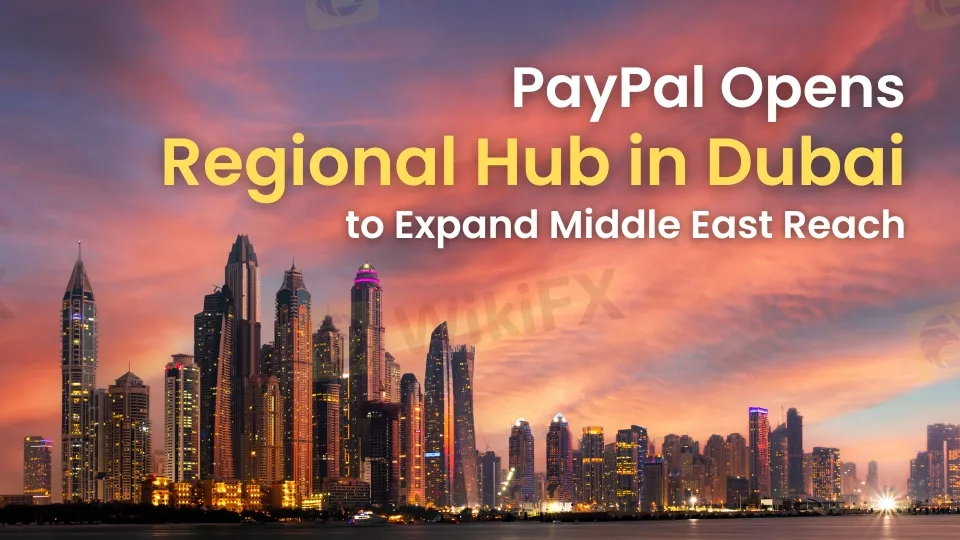简体中文
繁體中文
English
Pусский
日本語
ภาษาไทย
Tiếng Việt
Bahasa Indonesia
Español
हिन्दी
Filippiiniläinen
Français
Deutsch
Português
Türkçe
한국어
العربية
PayPal Opens Regional Hub in Dubai, Expands Middle East Reach
Abstract:PayPal opens Dubai hub as Middle East HQ & offers 3.7% PYUSD stablecoin yield, enhancing global commerce and digital assets in 2025.

PayPal has opened its very first main office in Dubai, a big move into the Middle East and Africa. This new center, set up in Dubai Internet City, shows PayPals promise to help people and companies in the area. It will make it easier for them to join the worldwide online money system.
This step will improve what PayPal can do in the region. It brings smooth payments, strong safety, and more links to global payment systems. With this bigger role, PayPal will help all kinds of businesses—big ones and small ones—sell to people far away and grow in the world market.
During the Dubai AI Festival 2025, Suzan Kereere, who leads PayPal‘s global markets, talked about how PayPal helps trade between countries. “PayPal is in a special spot to connect people buying things with businesses selling them across borders, helping local areas grow,” she said. “We’re proud to work with over 430 million people around the world, and we want to reach even more from our new base in the Middle East and Africa.”

Kereere also spoke about how smart tech, like artificial intelligence, is changing how we shop and pay. She said PayPal is building new tools, like clever wallets and smart trading systems, to give better and newer ways for people and businesses to use money online.
This news comes after PayPal made some big deals with partners in the area, showing they really want to grow here. Otto Williams, a top leader at PayPal for the Middle East and Africa, said working with banks, tech companies, and phone providers is key. “By teaming up, we can open up the worlds digital money system to more people,” he explained.
With this Dubai office, PayPal is ready to give small and medium businesses tools to find, win, and keep customers all over the world, helping the area move more into digital ways.
PayPal to Offer 3.7% Return on PYUSD for U.S. Users
PayPal is starting a new plan that gives U.S. users a 3.7% yearly gain on its money-backed coin, PayPal USD (PYUSD). This is a big part of its push into digital money and will begin this summer. People will get small daily rewards, added up and paid each month in PYUSD. They can keep this coin in PayPal or Venmo wallets to spend, send, or turn into regular cash.
This plan hopes to get more people to use PYUSD, making it a stronger choice among other digital coins like Tether (USDT). Right now, PYUSD is worth about $868 million, much less than Tether‘s $143 billion. At first, PYUSD grew bigger than Ethereum on the Solana system, but now it’s smaller again.

Jose Fernandez da Ponte, PayPals leader for blockchain and digital money, said this is part of a plan to make payments cheaper and faster. CEO Alex Chriss added that coins like PYUSD could change how payments work, making them quicker and easier.
PYUSD started in 2023 and is tied to U.S. dollars, short-term U.S. Treasury notes, and cash. Its run by Paxos Trust and was one of the first digital coins for everyday use from a big money company.
PayPal is also growing its crypto options. It now supports coins like Chainlink (LINK) and Solana (SOL) as it keeps adding digital money to its system. Plus, PayPal will soon let U.S. business users buy, sell, hold, and move cryptocurrencies.
To make crypto better, PayPal teamed up with MoonPay. This lets people in most countries (not Canada) buy PYUSD with regular payment ways. It should fix problems with debit card buys and make crypto deals work better and faster.
With these steps, PayPal keeps growing in the digital money world, giving more choices for people and businesses to use cryptocurrencies.

Disclaimer:
The views in this article only represent the author's personal views, and do not constitute investment advice on this platform. This platform does not guarantee the accuracy, completeness and timeliness of the information in the article, and will not be liable for any loss caused by the use of or reliance on the information in the article.
Read more

Vantage Markets Review 2025: Trusted Forex and CFD Trading Since 2009
Explore our 2025 Vantage Markets review! A trusted Sydney-based broker since 2009, offering forex, CFDs, low spreads, global regulation, and 24/7 support. Trade from $50!

IronFX vs Exness Review 2025: Comprehensive Broker Comparison
Explore an in-depth comparison between IronFX and Exness. Compare licensing, features, regulation, trading platforms, and customer service for smarter trading decisions.

eToro Review 2025: Top Trading Opportunities or Hidden Risks?
Is eToro a trustworthy broker or a scam in 2025? Explore its regulations, user reviews, and reputation to decide if it’s safe for trading forex, stocks, and crypto. Read now!

ASIC Urges Financial Licensees to Fix Register Errors Before 2026 Deadline
ASIC has warned AFS licensees to urgently correct errors on the Financial Advisers Register, with over 4,600 advisers still not meeting the 2026 qualification standard.
WikiFX Broker
Latest News
SkyLine Guide 2025 Malaysia: 100 Esteemed Judges Successfully Assembled
Vantage Markets Review 2025: Trusted Forex and CFD Trading Since 2009
Why STARTRADER Is Popular Among Traders?
A Guide to Intraday Forex Trading You Can't Miss Out
CONSOB Blocks Access to 13 Unauthorized Investment Websites
TradingPRO: A Closer Look at Its Licences
The world could be facing another ‘China shock,’ but it comes with a silver-lining
New SEBI Regulations on Intraday Trading
Everything You need to know about Barath Trade
IronFX Broker Review 2025: A Comprehensive Analysis of Trustworthiness and Performance
Currency Calculator


